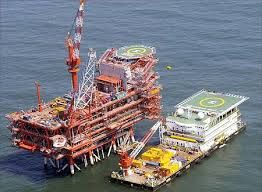 Petroleum Minister M Veerappa Moily said on Tuesday he is confident of resolving the issue of securing $135 million in bank guarantees from Reliance Industries within a fortnight to enable the company to charge higher gas price from April 1.
Petroleum Minister M Veerappa Moily said on Tuesday he is confident of resolving the issue of securing $135 million in bank guarantees from Reliance Industries within a fortnight to enable the company to charge higher gas price from April 1.
"I am confident of settling the bank guarantee issue with Reliance within a fortnight," Moily told reporters when asked if he would set a timeline for resolving the vexed matter.
According to the ministry, while the proposed bank guarantee would secure the government's interests on one hand, the higher pricing would protect the interests of RIL on the other.
The bank guarantee is being sought as the government feels that the steep fall in KGD6 gas output is not because of geological reasons, as is being claimed by RIL, but on account of the company's hoarding gas with to make a windfall gain from next April when gas prices will be doubled.
If the hoarding allegations are true, the bank guarantees would be encashed with interest for the period from April 1 to the date the charges are proved.
Moily met investors, financial institutions and analysts here last night ahead of the forthcoming NELP Round X auctions beginning mid-January.
He said unlike the flurry of negative news regarding the issues between the government and RIL, the only major issue is the arbitration settlement, which is pending with the courts now.
"We have, over the past few months, cleared as many as $7 billion worth investment proposals submitted by RIL," the minister said, adding that the media was only headlining the negative news.
Moily said he expects the Supreme Court to appoint a third arbitrator at the earliest so that the issues
The ministry had recently asked RIL to provide a bank guarantee of $135 million every quarter to get a higher price for natural gas from April 1.
The guarantee will be encashed if it is proved that RIL hoarded gas or deliberately suppressed production at the Dhirubhai-1 and 3 (D1&D3) -- main gas fields in its Eastern offshore KG-D6 block.
It will cover the difference between the current gas price of $4.2 per million British thermal units and the proposed new rate of $8.4 per million Btu.
The ministry had earlier proposed that RIL should be forced to sell gas from the D1&D3 fields at the current rate until it is proved that the 80 per cent fall in output was due to natural reasons or it makes up for the shortfall in production since 2010-11.
The penalty in the form of the lower gas price would have been the second imposed by the ministry on RIL for falling short of the stated production targets.
It had already levied a $1.8 billion penalty for the output drop and the issue is before arbitration.
Gas production from the D1&D3 fields has fallen to less than 10 million standard cubic metres per day from the peak of 54 mmscmd in March 2010.
Production has been lower than the target since the latter half of the 2010-11 fiscal and it should currently have been 80 mmscmd, as per the 2006 investment plan.
Output from the MA oil and gas field in the KG-D6 block too has fallen by over 62 per cent.
However, the ministry and the oil regulator -- Directorate General of Hydrocarbons -- have agreed with RIL's reasoning of geological complexity being responsible for the drop and has approved the higher price for the MA field's output.











 © 2025
© 2025